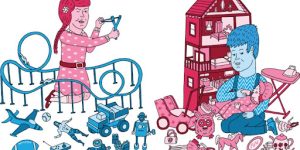
Gaydar? Nope, Just Stereotypes!
Is gaydar a reliable tool for identifying sexual orientation, or does it merely reinforce stereotypes that associate queer traits with appearance rather than true identity? Read the full article to find out!

Is gaydar a reliable tool for identifying sexual orientation, or does it merely reinforce stereotypes that associate queer traits with appearance rather than true identity? Read the full article to find out!

Dating apps make connections easy, but risks lurk beneath the surface. Queer people and AFAB individuals face unique dangers—here are five smart ways to spot red flags and stay safe while swiping.

We have come a long way in women’s struggles and have made a lot of progressive changes both politically and socially. However many people still hold onto the orthodox thought process about femininity and women’s role in society. Ever wondered why that is?

Reclaiming Sexuality: How Women in India Are Empowering Themselves Sex — The very topic remains largely a taboo in India, a land once home to

Gender dysphoria can make it difficult for trans men to care for their sexual health, creating barriers to self-care. This article offers practical tips to navigate dysphoria and maintain sexual well-being.

Many people believe lesbians are risk-free during sex since pregnancy isn’t a concern. But safety includes STIs too, which spread through skin contact, oral sex, and shared toys. This article clears myths and explains protection.

Drag has long been a space for challenging gender norms, but is it possible that some performances carelessly uphold misogynistic ideas? Let’s explore this paradox.

On 31st August, the NMC made several regressive revisions to the MBBS curriculum. These have now been withdrawn, however, it is still important to examine them and their impact carefully.
The Finance Ministry has clarified that there are no restrictions for LGBTQ+ individuals when it comes to opening joint bank accounts or nominating partners as beneficiaries, aligning with the Supreme Court’s stance on inclusivity.

Shirley Malcolm, a prominent figure in STEM once said in the 80s:
“ Science and technology are poorer for the loss of any talent because of personal attributes that are irrelevant to ability as scientists and engineers”. Have things changed since then?